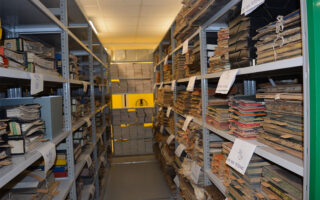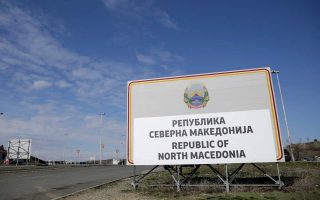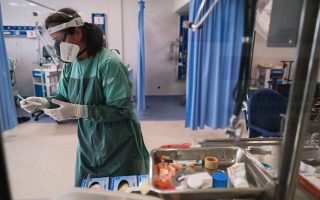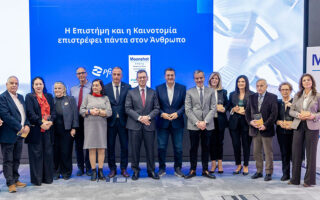Gloom hanging over southern Albania set to clear
PM’s rescheduled visit after earlier no-show should erase disappointment of ethnic Greeks, who want support to help deserted communities

“We had other plans for this day. The prime minister’s presence would have been a milestone for the Greeks here. We hope it takes place soon, as we’ve been assured,” the mayor of the southeastern Albanian Dropull-Pogon Municipality, Dimitris Tolis, tells Kathimerini just hours after Greek Prime Minister Kyriakos Mitsotakis called off a visit to Albania’s ethnic Greek villages during a trip to the neighboring Balkan country on December 6. (The news Wednesday from Mitsotakis’ office that he has rescheduled his trip for Thursday should therefore have put a lot of smiles on those villagers’ faces.)
Clouds cover the sky in Dropull, a rural plain that is home to 41 ethnic Greek villages with a total population of around 5,000, which, along with Himare (Himara) and Finiq (Finiki), is one of Albania’s historic centers of Hellenism.
“The prime minister’s visit would have been – and will be, if it takes place after all – a great moment for Dropull, for Pogon, for the Greeks of Albania. He could not be here today because of the weather, but I have been informed that he’ll visit the Dropull Municipality before Christmas. We had planned a gathering at the main square of Dervican, which his father had visited 31 years ago [in January 1990] when he was prime minister,” adds Tolis, referring to Konstantinos Mitsotakis. “I remember how people came from all over the area, even the most remote villages, walking as much as 10 kilometers to get there. There was a similar sense of enthusiasm now, which has been followed by disappointment. We expected more than a thousand ethnic Greeks.”
A similar sense of disappointment is evident in the villages of Vurg (Vourgos) and Himare. “People took it badly, they’re feeling bitter and believe that there’s more to the issue than the weather,” the former president of the Omonoia organization for ethnic Greeks, Leonidas Pappas, tells Kathimerini, speaking from the village of Aliko in Finiq. With 60 ethnic Greek villages, Finiq’s population has dwindled to a quarter of the 40,000 ethnic Greeks that lived here before the borders were opened in the 1990s. The municipal authority has planned a welcome ceremony, a visit to a Greek school and meetings with community leaders.
‘One village has died out completely and at another, Mavrogero, there’s only a grandfather and a grandmother left’
Expectations were great, not just because of the symbolic significance of such a visit, but also because people also hoped to see a willingness to address some of their problems, such as the matter of pensions. And now, many are not convinced by the excuse given for the visit’s cancellation: that the helicopter Mitsotakis was traveling in could not land because of the weather.
“People here believe that the minority was exploited, again, in order to make some headway with other issues, like the exclusive economic zone,” says Pappas, referring to a maritime borders agreement that is being discussed between Greece and Albania. Everyone this reporter spoke to wanted to know the “real reason” why the prime minister went straight to Tirana and skipped the planned tour.
The fact is that both Mitsotakis and the Albanian leadership had something to gain from it happening. For the premier, it was highly symbolic and would have conveyed his government’s interest in the community’s future, while it may also have been an opportunity – in light of next year’s elections in Greece – to announce some practical help and support measures. Albanian Prime Minister Edi Rama, for his part, is also trying to score points with the minority community in light of the municipal elections coming up, while he would also be able to show the European leadership – which was gathered in Tirana at the time for the EU-West Balkans Summit – that he is committed to protecting the rights of his country’s minorities.
Dimos Poulos has the only taxi in Pogon and has spent the past 22 years getting medicine and food to the handful of elderly ethnic Greeks living in its mountains. He was among the first to reach Ioannina in northwestern Greece when the great exodus from Albania began in 1991. Unlike others, he returned after a short stay in Greece, disenchanted by the treatment he and others like him has received from their “brothers,” the Greeks. Thanks to a jalopy someone had given him in Ioannina, he was able to go into business as a taxi driver.
He laments the desertion of the villages in the area. “One village has died out completely and at another, Mavrogero [Mavrojer], there’s only a grandfather and a grandmother left,” says Poulos, who makes the treacherous crossing across the Kelcyre Gorge twice a week to reach the residents of Mavrojer, Polican, Skore, Drymades and other remote villages. If they’re cut off by heavy snow, say, the nearest source of assistance is the guard post on the Greek-Albanian border.
Athanasios Nakas, a resident of Polican, had been planning to attend the gathering in Dervican and hoped to ask Mitsotakis to help fix the road across the gorge. I met him at the local kafeneio and asked what he thinks the future will bring for these villages. “There is no future,” he says. Everyone else I ask seems to think the same: that unless young people are given incentives to return, the villages will slowly die out. Those who left for Greece may send money back to their parents and fund repairs for their houses, but they’re not interested in returning to work the land or open their own businesses. It has been more than 30 years since the borders opened and only now have residents here come to terms with the fact that the Greeks were not chased out by the Albanian regime, but left of their own volition, looking for a better future in Greece.
“Before 1991, these 41 villages were full of people. Now, unfortunately, they are empty. We’re hoping young people will start coming back and this is something Greece can help with,” says Tolis, the mayor of Dropull-Pogon.
“We have some of the biggest businesses in Albania here in Dropull and all of them were supported by Greece, which helped us and will continue to do so. We are now discussing a program for providing young people who move back with some kind of fixed, minimum income. It’s one of the things we want to put to the Greek prime minister. An amount of, say, 300 euros a month for a few years for every young person moving back. That might save the minority.”






